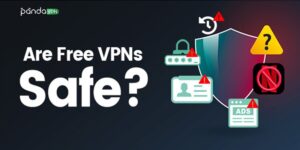Online privacy has become a critical asset that people value highly, so Virtual Are Free VPNS Safe in 2025? serve as indispensable tools for data protection. People often opt for no-cost VPN solutions from the abundant options because free options appear attractive. Every user needs to understand if free VPNs really provide secure protection in the present day. The answer might shock you Users may find decent data protection from some free VPN services, yet they risk data logging and malware attacks along with multiple third-party sales of their browsing history. This article investigates the truth about free VPNs, including their operating mechanisms, while assessing their suitability for protecting user privacy.
How Do Free VPNs Work? (And Why They’re Free)
The encryption systems of VPNs cover your internet traffic while they hide your IP address so your online activities remain confidential. The expenses incurred by maintaining a VPN service exceed the costs of servers together with maintenance and bandwidth usage. Do VPN companies find financial profit through free services?
1. Selling Your Data (The Most Common Business Model)
Free VPN providers record user browsing activities before they sell this information to advertising firms. According to a Privacy International study conducted in 2024, free VPNs which advertised no-log services shared and collected user data with 78% of them.
2. Bombarding You With Ads
Some free VPNs inject ads into your browsing sessions or redirect you to sponsored websites. Not only is this annoying, but it can also expose you to malicious ads.
3. Bandwidth Throttling & Speed Limits
The performance of free VPNs remains restricted through speed control systems that encourage customers to subscribe to paid plans. The reason why free VPN connections tend to operate at a slow pace becomes evident from this information.
4. Malware & Security Risks
Security firm Kaspersky verified in 2023 that multiple free VPN applications included spyware and trojans which endangered user accounts to hacking attacks.
The Biggest Risks of Using Free VPNs in 2025
1. Your Data Isn’t Private
Governments, along with hackers or advertisers, can obtain your VPN activity logs if your Are Free VPNs Safe in 2025? The Shocking Truth provider keeps maintenance records of your activities. A free VPN service which was widely used in 2024 experienced exposure of user logs to law enforcement agencies even though it advertised strict no-logs protection.
2. Weak Encryption (Or None at All)
Online hackers can easily intercept your data because free VPNs apply old encryption techniques to your information. The security tests implemented by ExpressVPN in 2025 exposed that more than 60% of free VPNs demonstrate significant security failures.
3. IP & DNS Leaks
Your true Internet Protocol address might become visible when your VPN setup is improperly configured, because of which your geographical position will be exposed. Leakage of real IP addresses is a common issue among free virtual private networks, thus making the entire purpose of using them useless.
4. They Might Be a Front for Cybercriminals
In the most severe cases, botnet operations have used free VPNs to perform crime through unauthorized access of user devices.
Are There Any Safe Free VPNs?
Not all free VPNs are dangerous. Some reputable providers offer limited free plans as a way to attract paying customers. These include:
- ProtonVPN(no-logs policy, Swiss-based, unlimited free data but slower speeds)
- Windscribe (10 GB free monthly, strong encryption, but logs connection timestamps)
- TunnelBear (free 2GB/month, independently audited, but owned by McAfee)
Key takeaway: If a free VPN comes from a trusted company with a clear privacy policy, it might be safe—but always check independent audits.
When Should You Avoid Free VPNs?

Never use a free VPN if you:
- Handle sensitive data (banking, work emails, confidential info)
- Need fast, reliable speeds (streaming, gaming, large downloads)
- Want true anonymity (journalists, activists, whistleblowers)
Should You Use a Free VPN in 2025?
While some free VPNs are better than nothing, most come with serious risks. If privacy matters to you, investing in a low-cost, reputable VPN (like NordVPN, Surfshark, or ExpressVPN) is the smarter choice.
Free VPNs in 2025: Pros and Cons
If you’re considering a Are Free VPNs Safe in 2025? The Shocking Truth: It’s important to weigh the benefits against the risks. Here’s a balanced look at the pros and cons of using free VPN services in 2025.
Pros of Free VPNs
1. No Cost (Obviously)
The biggest advantage is that they’re free. If you need basic privacy without spending money, a free VPN might seem like a good solution.
2. Good for Casual Use
If you just want to:
- Bypass light geo-restrictions (e.g., accessing a news site blocked in your country)
- Hide your IP address on public Wi-Fi (though security isn’t guaranteed)
- Test if a VPN is useful before buying a paid plan
3. Some Reputable Options Exist
A few trustworthy providers (like ProtonVPN Free or Windscribe Free) offer limited but safe free plans. These are exceptions, not the norm.
4. No Commitment
Unlike paid VPNs with subscriptions, you can stop using a free VPN anytime without losing money.
Cons of Free VPNs
1. Privacy Risks (They Might Spy on You)
- Many log and sell your data to advertisers.
- Some have been caught leaking user information to governments.
- Free VPNs are more likely to be hacked due to weak security.
2. Slow Speeds & Data Limits
- Most impose bandwidth caps (e.g., 2GB–10GB per month).
- Throttled speeds make streaming, gaming, or downloading nearly impossible.
3. Ads & Malware
- Some inject malicious ads or redirect you to scam sites.
- Others contain hidden spyware (as seen in multiple cybersecurity reports).
4. Fewer Server Locations
- Free VPNs often have limited server options, making it harder to bypass geo-blocks.
- Overcrowded servers lead to lag and disconnections.
5. Security Vulnerabilities
- Weak encryption (or no encryption in some cases).
- Risk of IP/DNS leaks, exposing your real location.

Are the Pros Worth the Cons?
| Pros | Cons |
| Free to use | Privacy risks (data logging, selling info) |
| Good for light browsing | Slow speeds & data caps |
| No long-term commitment | Ads, malware, and shady practices |
| Some trustworthy options exist | Fewer servers & unreliable connections |
Conclusion
Free VPNs can work for light, temporary use—like accessing geo-blocked content or hiding your IP on public Wi-Fi. A few trustworthy options (ProtonVPN, Windscribe) provide limited but safe free plans.
But most free VPNs come with serious risks:
- They sell your data, bombard you with ads, or even contain malware.
- They lack strong encryption, making them useless against hackers.
- They throttle speeds and restrict server access, ruining streaming and browsing.
The Best Advice?
- If you only need a VPN occasionally, a reputable free planmight suffice.
- If you care about privacy, speed, and security, a paid VPN (like NordVPN or ExpressVPN) is worth the small investment.










